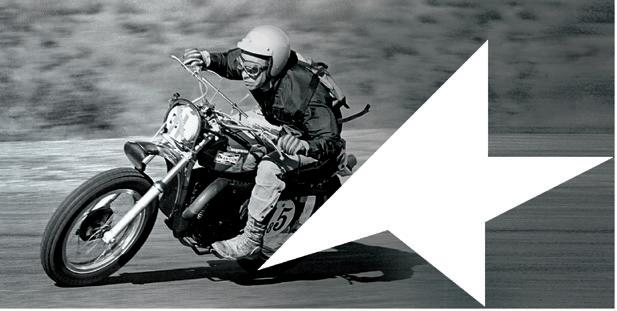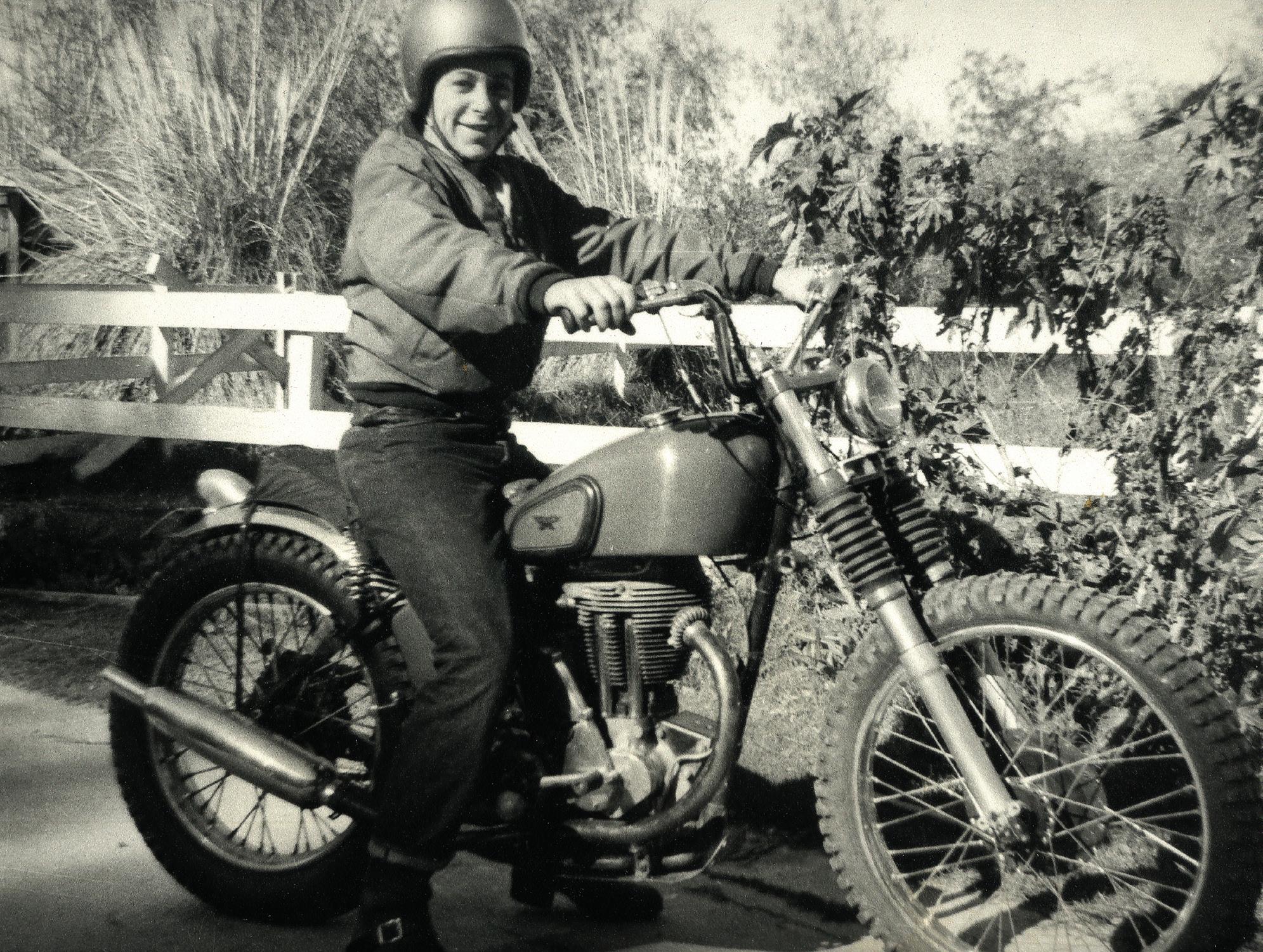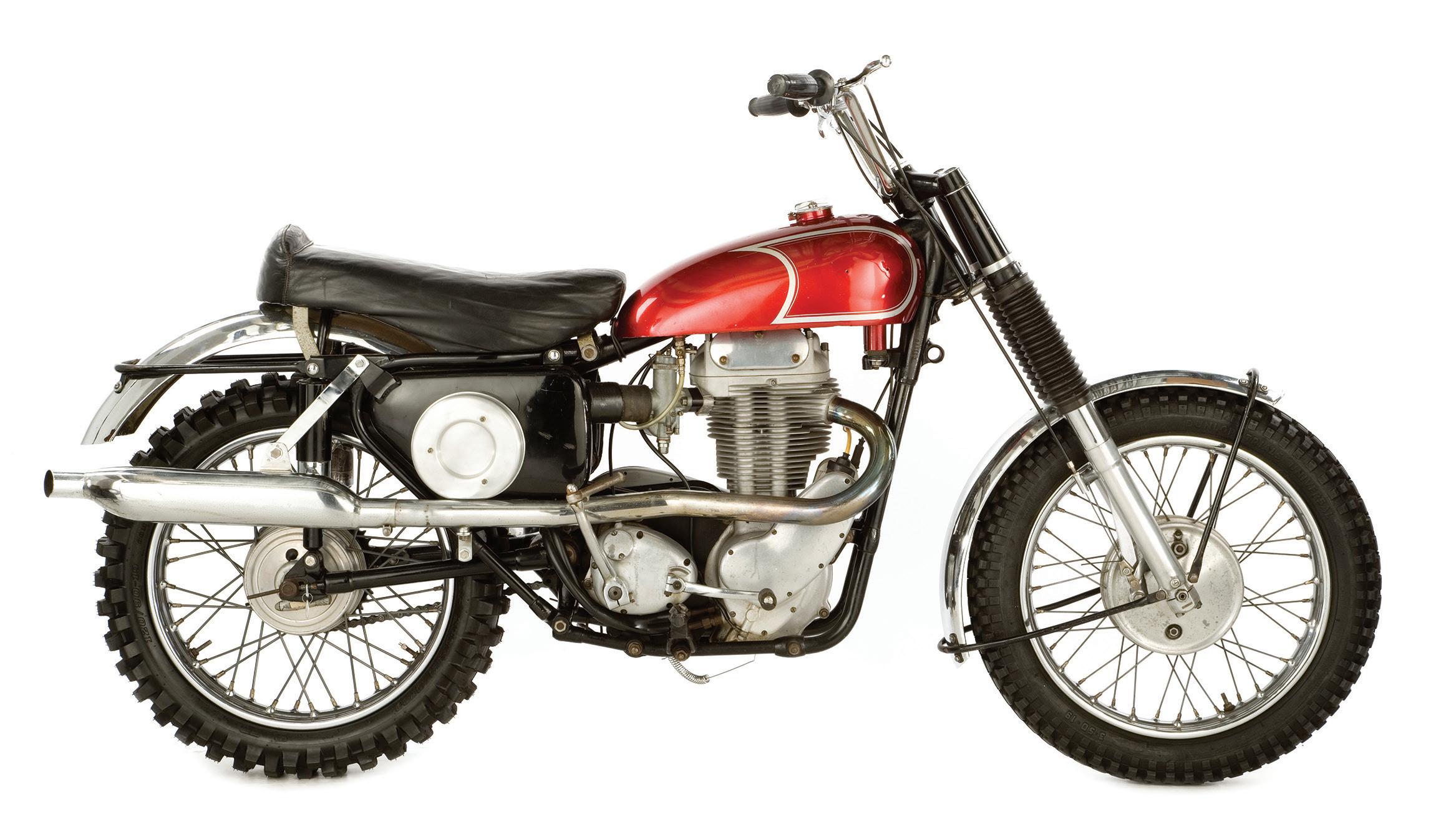
5 minute read
MALCOLM’S MOMENTS

PART FIVE PAPPY MOTT
BY MALCOLM SMITH
Learning about motorcycles, business and life at San Bernardino’s Mott’s Cycle
Iwas constantly fixing that Matchless, and with little money to spend on fresh parts, I found myself rooting through the trash bins of a local shop owned by Rush “Pappy” Mott for things like tires, plugs, sprockets, etc. — and getting those pieces to work on my bike improved my mechanical skills.
Mott’s was your typical old-school biker shop…dark, dingy and a little dank, with girlie magazine centerfolds on the wall. The bathroom was always filthy, and you’d never catch a woman there. The mechanics were what you’d expect: bikers and racers, blue-collar guys who’d grown up around motorcycles, cigarettes and booze. A tough crowd, for sure.
After catching me parts-scrounging a few times, Pappy offered me a job. “You’re always here,” he said, “so you might as well clean up.” I liked the idea and started working for — I think — 50 cents an hour. My mom wasn’t happy; Pappy’s guys weren’t the types she wanted me associating with.
Pappy, who hobbled around on a wooden leg courtesy of a bike accident in his early years, was an eccentric, no doubt, but a savvy businessman, and had a lot going on. He sold and serviced new bikes (Matchless, Zundapp, AJS and a small Japanese marque called Honda, which was just beginning to make waves in the U.S.) and used bikes, but also provided financing (bike loans being rare at the time) and did a lot of used-part and salvage business.
I did general clean up, mostly, and also cleaned parts for the mechanics. I’d sit there with a gallon of gasoline and a brush, or clean greasy engines or frames out back with a sprayer using old wine bottles filled with a 70/30 mix of Kerosene and degreaser. You know the old saying about a
British bike that isn’t leaking, don’t you? It’s out of oil!
I’d also run to Pappy’s many parts stashes and grab needed pieces from the carcasses there. He’d say, “Malcolm, go grab that ’48 Harley rear wheel from the barn on 3rd Street,” and I’d head out on the shop’s threewheeled Servi-Cycle, going around corners on two wheels with a big smile on my face.
Pappy made money via financing, but he also had to occasionally repossess one from a non-paying customer, and I helped. He had an old flatbed trailer with enough room for three bikes, and when we got close to where the bike was parked, he’d sit in the truck with the engine running, I’d put the ramp down, run to the bike, grab it and push it into the trailer. I’d lean it over on the stand, hunker down while still holding on, and off we’d go, stopping a few blocks later to tie it down properly. Luckily, we never got shot.
Pappy realized I had some mechanical aptitude, but that I had lots to learn. When I mentioned my Matchless engine being slow and noisy, he took a close look and told me the engine had already been bored to its maximum, and because it did not have an air filter it’d been sucking dirt since I’d gotten it, and probably prior to that. I had no idea an air filter was that important.
I learned another valuable lesson a few months later. He’d thrown away some old accessory catalogs and I grabbed a few to read later at home. What I saw on the Webco dealer price sheet shocked me. “Pappy,” I jokingly said to him the next day, “you’re a crook! You buy a part for $10, and you sell it for $20!”
He laughed and said, “Son, come on into my office,” and began to write on a sheet of paper: “Price of part: $10.” Then he wrote, with dollar numbers next to each entry: Rent. Then, Labor. Utilities. Freight. Shop supplies. And so on. At the end, he figured he made 86 cents on that part. Suddenly, I understood the concepts of margin and overhead. They’ve stayed with me for many, many years.
In a lot of ways, Pappy was a father figure, teaching me things I needed to know, just as my mom and dad had, but in a way that would benefit me as I got into business. And I was learning, absorbing some of his business savvy.
One of the jobs I took on was setting up 50cc Honda Cubs in the evenings after the shop closed. None of the other mechanics wanted to do it; they called the Hondas “Jap Junk.” I’d ridden them and was impressed with their design and functionality; they were small but very well built, and they didn’t leak oil.
The Cubs came packed two (and sometimes three) to a crate, so I’d clear a space, and instead of setting them up one by one, as the mechanics did, I’d pull ten out of their crates, line them up next to all the parts to be installed, and do each individual operation to all ten bikes, assembly-line like, before moving on to the next process. In a few hours I was done, and at $5 per bike, I made $50 in a third of the time it took the regular mechanics to make that much.
When they saw the Cubs ready to go the next day they’d ask what time I’d gone home, and I’d tell them “really, really late” when in reality it was more like 8 or 9 p.m. I did not want them horning in on my newfound gravy train! Of course, they eventually figured out what I was up to, and soon began setting up Cubs whenever they could.
I was learning a lot at Mott’s, but also meeting some interesting people, including mechanics and riders that were way into racing, and of course that was really interesting to me. More on that next month.
One of several Matchless models I owned over the years. Get your copy of my autobiography at themalcolmbook.com.







